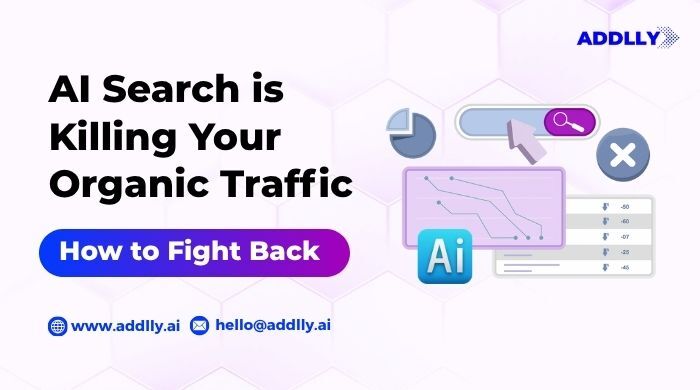As artificial intelligence continues to reshape the way we interact with search engines, many businesses are seeing a significant shift in their organic traffic. AI search features, like Google’s AI Overview, AI-generated answers, and zero-click searches, are becoming dominant features of search results pages. These AI-driven changes are directly impacting your organic search performance, causing traffic drops and less visibility for organic results.
In this article, we’ll dive into why AI search is making such a deep impact on your website’s organic traffic, and how you can adapt your SEO strategies to embrace AI optimization, answer engine optimization (AEO), and generative engine optimization to boost your visibility and keep your brand in front of the right audience.
Quick Summary – How AI Search is Killing Organic Traffic
AI search is changing how people use Google, and it’s slashing brands organic traffic. With AI Overviews, zero-click searches, and chat-style answers giving users what they need instantly, fewer people are visiting websites.
To fight back, shift your SEO toward Answer Engine Optimization (AEO) and AI-focused strategies:
- Structure content for direct answers and use schema markup.
- Optimize for voice and conversational queries.
- Rewrite content for AI consumption
- Create in-depth, expert content that goes beyond what AI summaries can deliver.
- Use visuals and structured data to improve AI visibility.
- Continuously monitor AI search trends and refine your strategy.
- Benchmark your competition’s citation metrics witih Addlly AI’s GEO Audit Tool.
AI search isn’t killing SEO, it’s evolving it. Brands that adapt to AEO and AI-driven optimization will stay visible in the new search era.
Why AI Search is Killing Your Brand’s Organic Traffic
To understand how AI search is impacting your search traffic, we first need to look at the way AI is changing the search landscape.
AI-Powered Search Features
AI-powered search features, such as AI-generated answers and direct answers, are being integrated into search results across major search engines, including Google’s search results. These AI generated replies are designed to provide concise, immediate responses to informational queries, often before users even have to click through to a webpage.
For instance, Google now often generates a summarized answer right on the search page, known as Google AI Overviews. This is especially true for informational searches where users typically want quick answers rather than full-length articles. As a result, click-through rates (CTR) for traditional organic results are plummeting, as users get the answers they need directly from the search engine, without clicking through to a website.
Zero-Click Search
Zero-click searches are another AI-driven phenomenon that’s affecting your organic traffic. A zero-click search occurs when AI search engines provide an answer to the query without users needing to visit any website. This includes AI-powered snippets, featured snippets, and AI-generated content that answers questions directly on the search page.
For example, Google’s AI Mode can now show AI-generated content in the form of summarized answers or AI overviews, reducing the need for users to click through to your site. While these changes are great for user experience, they are leading to fewer users clicking on your site, significantly hurting your website traffic.
The Rise of AI Chatbots
AI chatbots are also becoming a common feature in search. ChatGPT, Perplexity AI, and other AI search chat tools, now generate AI-powered summaries and interactive responses to queries, removing the need for users to engage with traditional search results. Instead of scanning search results for a solution, users are interacting directly with chatbots, which summarize answers based on what the AI models determine is most relevant.
The shift toward AI chatbots further reduces search traffic from organic medium, as AI-powered tools dominate the space, providing users with quick, in-depth answers.
How AI Search Impacts Organic Search
Now that we understand how AI search is impacting traditional search, let’s look at how this is specifically affecting SEO efforts and organic search.
Fewer Organic Clicks
With AI-generated content, zero-click searches, and AI-driven snippets now dominating search results pages, many users aren’t clicking on organic links as frequently. Since AI answers are often displayed directly on the search page, there’s less need for users to engage with organic content.
This trend is causing SEO professionals to rethink their strategies. Traditional SEO tactics, like meta descriptions and keyword optimization, are becoming less effective at driving website traffic compared to AI-optimized content that caters to user intent directly.
AI Overviews and Content Visibility
In some cases, Google launched AI overviews that summarize search queries and show them directly at the top of the search page. These summaries often appear above organic search results, capturing user attention and displacing traditional search results. While AI-driven overviews may be good for user experience, they’ve made it harder for businesses to gain visibility in search results, particularly for high-volume informational queries.
Impact on Featured Snippets and Direct Answers
Featured snippets are another casualty in the rise of AI-generated answers. AI search tools, including Google AI, are increasingly offering direct answers to user queries, eliminating the need for a user to click through to the website that would traditionally have appeared in a featured snippet.
As a result, businesses that once relied on featured snippets for increased visibility are seeing significant drops in organic search traffic. The loss of organic traffic in favor of AI-generated content is forcing businesses to reconsider their SEO practices.
How to Fight Back Against AI Search Killing Organic Traffic
While AI search is undeniably impacting organic traffic, there are ways for businesses to adapt their SEO strategy and fight back.
1. Embrace Answer Engine Optimization (AEO)
As AI search engines continue to evolve, it’s important to shift your SEO strategy to Answer Engine Optimization (AEO). AEO focuses on structuring your content to provide direct answers that can be pulled by AI tools for AI-generated answers. Here’s how to implement AEO:
- Provide clear, concise answers to common informational queries.
- Use structured data (JSON-LD) to ensure AI systems can easily pull relevant data from your pages.
- Optimize for zero-click searches by structuring content to answer questions without requiring users to click away.
2. Optimize for Voice Search
With the rise of voice search and AI-powered chatbots, it’s essential to adjust your content to be optimized for natural language queries. Since voice search tends to be more conversational, you should:
- Target long-tail keywords that mimic how people speak.
- Ensure your content is aligned with user intent and provides direct answers to conversational queries.
- Use schema markup to help AI search tools understand the content and provide AI-generated summaries.
3. Focus on Content Depth and Expertise
While AI search is great for delivering quick, summarized answers, there’s still a significant demand for in-depth content. AI-driven search engines may provide quick answers, but they often lack the depth that users need for more complex queries. Here’s how to stay competitive:
- Create long-form content that goes deep into topics and answers follow-up questions.
- Focus on building internal topic clusters that connect related pieces of content together, providing a comprehensive resource for users.
- Highlight your expertise by focusing on high-quality, well-researched content that adds value and provides actionable insights.
4. Optimize for AI Tools and Search Engines
It’s important to ensure your website is optimized for AI search tools like ChatGPT and other search engines. This means:
- Optimizing for AI search algorithms by ensuring your site has high-quality structured data and relevant keywords.
- Regularly auditing your site with Google Search Console and Google Analytics to ensure site performance and search visibility are maintained.
- Using AI tools to analyze search trends and refine SEO strategies accordingly.
5. Use Visual Content and AI-Optimized Formats
AI search tools are becoming more adept at analyzing visual content. By using visuals like images, videos, and infographics, you can increase your chances of appearing in AI-generated snapshots and featured snippets.
- Embed visuals and optimize them with structured data to increase the chances of being picked up by AI systems.
- Use content formats that AI tools can easily interpret and repurpose across platforms (e.g., blogs, videos, and social media).
6. Monitor and Adapt to AI Search Trends
AI search is a rapidly evolving field, so staying updated on emerging trends is essential. Regularly monitor AI search trends using tools like Microsoft Clarity, Google Search Console, and Google Analytics to track changes in search results and user behavior. Adjust your SEO practices based on these insights to maintain visibility and traffic.
Conclusion
AI search is undeniably changing the way businesses approach SEO. While AI-generated answers and zero-click searches are causing a significant drop in organic traffic, there are strategies you can implement to stay competitive. By embracing Answer Engine Optimization (AEO), voice search optimization, and focusing on content depth and AI tools, businesses can fight back against the shift in search behavior and maintain visibility on search results pages.
The future of search engine optimization will be shaped by AI, but with the right strategy, businesses can continue to thrive in the evolving search landscape.
FAQs – How AI is Killing The Organic Traffic
How is AI Search Affecting My Organic Traffic?
AI search is impacting organic traffic by providing direct answers in search results, often without users needing to click on websites. Zero-click searches and AI-generated answers are becoming more common, reducing click-through rates for traditional organic listings.
What is Answer Engine Optimization (AEO)?
Answer Engine Optimization (AEO) is the process of optimizing your content to be easily pulled by AI search engines for direct answers. This involves structuring your content to provide clear, concise answers to user queries and using structured data to ensure that AI systems can easily extract and display your content in zero-click searches and featured snippets.
What is the Role of AI-Generated Content in SEO?
AI-generated content plays a major role in the future of SEO by enabling websites to scale content creation while ensuring it meets AI search standards. By leveraging AI tools for content creation, brands can provide relevant, on-demand content that aligns with user queries and search intent, improving visibility in AI-powered search results.
Why Are My Click-Through Rates Dropping?
Your click-through rates (CTR) may be dropping due to zero-click searches, where AI search tools like Google AI and AI-generated answers are providing information directly on the search results page without users needing to click through to a website. As more AI-powered features appear, organic results are pushed further down the page, reducing visibility.


